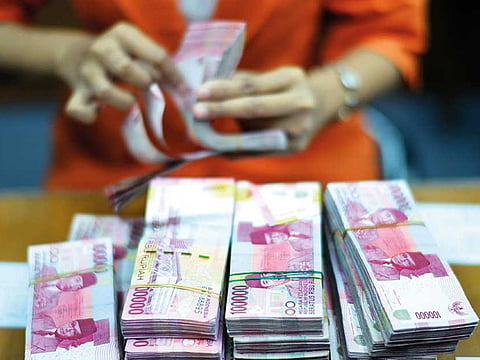Indonesian rupiah hits 20-year low
Indian rupee firms 0.2% after last week’s record lows

London: In a sign of the pressure on emerging currencies, the Indonesian rupiah fell 0.7 per cent to its lowest level since the Asian financial crisis in 1997-1998.
The rupiah has weakened nearly 9 per cent against the dollar so far this year, one of the worst affected currencies in the emerging markets sell-off, despite repeated interventions from the central bank. Indonesia’s inflation picked up in August, but remained within the central bank’s target range.
Indonesian stocks fell 0.9 per cent, while five-year credit default swaps rose to an eight-week high of 131 bps, according to IHS Markit data.
On a brighter note, Argentina’s peso, which plummeted last week, firmed over 6 per cent on Friday after the central bank auctioned $250 million (Dh918 million) in dollar reserves and the International Monetary Fund issued a strong statement of support for President Mauricio Macri’s government.
The Indian rupee also firmed 0.2 per cent from last week’s record lows after economic growth surged to 8.2 per cent, its highest in more than two years. However, manufacturing growth unexpectedly slowed in August as domestic demand softened.
Weak factory activity data from across emerging markets helped push MSCI’s benchmark emerging stocks index down 0.5 per cent to one-week lows.
China’s factory activity grew at the slowest pace in more than a year in August, reinforcing views of a cooling in the world’s second largest economy as the trade dispute with the United States drags on.
The United States is still set to impose 25 per cent tariffs on $200 billion of Chinese goods once a public comment period ends on Thursday.
Chinese mainland shares fell 0.4 per cent, despite the inclusion of another tranche of stocks in MSCI’s EM index.
Hong Kong shares slipped 0.6 per cent weighed down by another 2.5 per cent fall in Tencent amid China’s crackdown on online gaming.
Other big fallers included South Korea, down 0.7 per cent after factory activity contracted for a sixth successive month.
But Warsaw shares rose 1.05 per cent, although Poland’s manufacturing growth was at its lowest in 22 months.
The zloty also firmed 0.2 per cent against the euro.
Hungary’s forint weakened a touch, with some disappointment that Fitch did not upgrade Hungary’s sovereign rating in a review on Friday.



